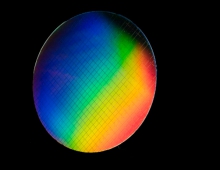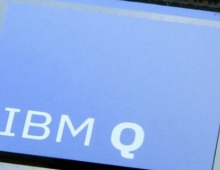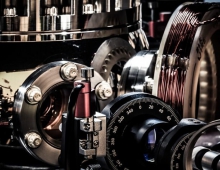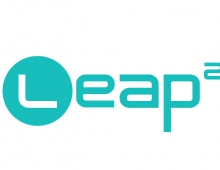
Fujitsu to Showcase Quantum-Inspired, Digital Annealer Computational Architecture at Mobile World Congress 2018
At Mobile World Congress 2018, Fujitsu will showcase the Digital Annealer computational architecture, which uses quantum-inspired digital circuits to more rapidly solve combinatorial problems.
Fujitsu says that the Digital Annealer technology is an alternative to Quantum Computing technology, as it bridges the gap between classical computing architectures and quantum computers, providing practical yet impressive computing power that can be deployed in existing infrastructures.
Quantum computers are based on the principles of quantum theory, which explains phenomena that occur at the atomic and subatomic levels, such as the behavior of electrons. In quantum mechanics, the phenomenon known as "superposition" refers to the simultaneous appearance of two different states, "0" and "1." This phenomenon forms the basis of "quantum bits," which can dramatically improve operation speeds.
Despite their enormous potential, quantum computers remain in the nascent stages of development, and many countries and regions invest heavily in research and development to further realize this radical approach to computing.

AI and data science has been a major focus area for businesses that want to take it to the next level. Currently solving challenges of a Combinatorial Optimization nature requires immense amount of computational power that can only be met by quantum computing methods as opposed to classical computing methods that are in use today.
Combinatorial optimization refers to finding the most optimal solution from a finite set of options. However, as the finite set of options increases, the computation power and the time needed to find the solution increases exponentially.
To solve these challenges, Fujitsu used conventional semiconductor technology and developed Digital Annealer.The technology uses a digital circuit design inspired by quantum phenomena. It has a fully connected architecture enabling freely exchanging signals solving large-scale combinatorial optimization problems instantly.
Digital Annealer has 1024-bit full interconections with 16-bit precision that can achieve high accuracy of 65,536 scale which is higher than any other quantum annealing technology that uses superconducitivity today. Most of all, Digital Annealer can operate at normal temperature without the need for absolute zero (-273.15°C) temperatures for functioning at quantum state.
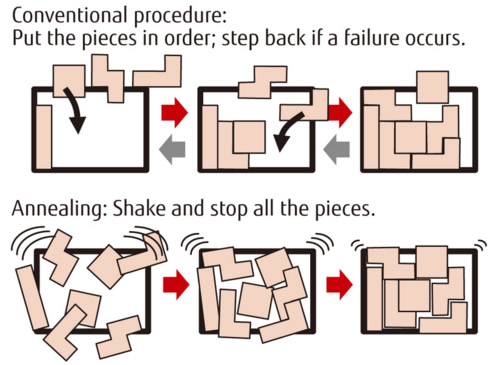
Digital Annealer also fits in a conventional data center rack, as opposed to quantum computers which require considerable amounts of costly underlying infrastructure in order to function at all.
The Digital Annealer can be used for combinatorial problem-solving scenarios with real-world applications, such as comparing molecular similarities for the development of new drugs, or for the optimization of investment portfolios.
One of the most well-known examples of this type of problem is the traveling salesman problem which states - "When a salesman must visit several cities and then return to the origin city, which visit order minimizes the salesman's total traveling distance?"
When the number of cities is just two or three, the solution can be found in a moment. However, when the number is increased to say 30 cities, it takes a classical computer approximately 800 million years to perform round-robin calculations in order to find the optimal solution.
According to Fujitsu, such severe limitations are easily solved by Digital Annealer, which can quickly solve this problem type, making it an ideal solution of combinatorial optimization problems that businesses are facing today.
Fujitsu has established strategic partnership agreements with Canadian company 1QBit, the only vendor of commercial quantum computer software at the moment, and the University of Toronto, an internationally top-tier innovation hub.
Fujitsu Digital Annealer solution uses 1QBit software and its quantum algorithms that has become a standard in quantum computing.
Biometric Authentication Software "AuthConductor Client" for PCs
Fujitsu also launched the Fujitsu Security Solution AuthConductor Client, a suite of biometric authentication software for PCs. The product is intended for markets throughout the world, starting with immediate availability in the Oceania region.
AuthConductor Client provides a secure authentication environment that can replace IDs and passwords when used with notebook PCs and tablets embedded with Fujitsu-made palm vein sensors and fingerprint sensors, or with external sensors connected via a USB.
Setting up to use AuthConductor Client is easy, with support provided by appropriate instructional animation when registering biometric information. Additionally, given its compatibility with Active Directory that enables unified management of biometric information and login status, it develops an environment in which multiple users can operate the same PC, and enables management of access logs.
Fujitsu plans to successively roll out AuthConductor Client to markets in Asia and North America by September 2018.



